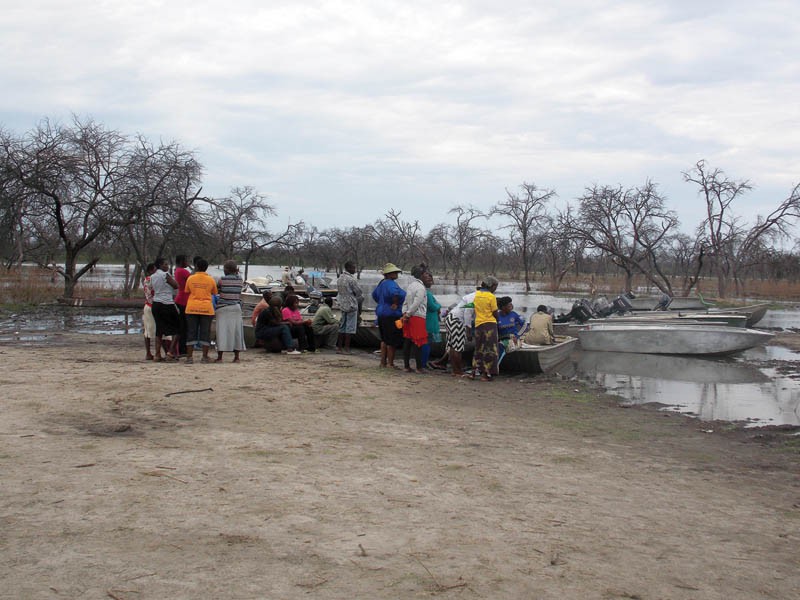Police, wildlife officers implicated in illegal fishing
Boniface Keakabetse | Friday January 15, 2016 15:38


Illegal fishing has become rampant in the lake since government instituted a fishing ban to curb rampant pollution at the fishermen’s camps. In March 2015, government announced the suspension of fishing at Lake Ngami up to February 28, 2016.
The suspension was effected to solve environmental concerns, allow the finalisation of fishing regulations and for the development of the Lake Ngami Community Trust. However, Sehithwa Police Station is already inundated with cases of illegal fishing as fishermen invade the lake in droves following the fishing suspension.
The Department of Wildlife and National Parks (DWNP) is reportedly struggling to deal with illegal fishing. The fishermen stay hidden during the day and move in to fish at night. Assistant Wildlife Officer at the Fisheries Division in Maun, Sylvester Dikhai, said the illegal fishermen fish during odd hours around 11pm to 5am when they know it is difficult for them to be arrested. He said they use canoes to fish in the dangerous parts of the lake where they know the law enforcement officers would not access for safety reasons.
He said in December they recorded about five cases involving 24 fishermen who were each fined P500 for illegal fishing. This year two people have already been arrested and were also fined P500 each.
Mmegi understands that organised fishing syndicates that are attracted by the lucrative markets in Zambia are operating at the lake where they take advantage of laxity in lake patrols by law enforcement officers. The syndicates are reportedly connected to Zambian fish traders and some suspected rogue police officers and officers in the department of wildlife. Some of the officers are reportedly known to fish traders while others reportedly receive bribes from the fishermen and Zambians to allow the indiscriminate fishing to go on.
While refusing to shed more details, Dikhai confirmed the allegations. Deputy officer commanding for police District No. 5, Superintendent John Kelebeng however vehemently denied that some of their officers were involved in illegal fishing.
Dikhai confirmed that they have speculations linking some public officers to the ongoing illegal fishing saying that the issue has been forwarded to the director of DWNP to deal with.
Kelebeng however denied the allegations saying apart from only one officer who has been suspended from the service for illegal fishing there are no more police officers undertaking illegal fishing or receiving bribes from the fishermen.
In July last year a police officer was suspended in Sehithwa after he was caught fishing illegally in Lake Ngami. The officer from the Criminal Investigation Department (CID) was caught with loads of fish together with a local resident.
Kelebeng said: “If there are such issues they have not reached our offices as we would have expeditiously investigated them because such incidents are not only bad but could tarnish the image of the police service.”
Sources within the fisheries division of the DWNP have made fresh damning revelations that scores of police officers at Sehithwa police station and some wildlife officials still have a hand in the ongoing illegal fishing.
“Recent investigations conducted whose findings have been made available to the superiors at DWNP have linked certain police and DWNP officers to the illegal fishing business,” a source in the department revealed this week. According to the source, public officers have so far ensured that bulk illegal fishing cases go unreported.
“What was discovered was that officers warned fishermen of looming illegal fishing patrols and road blocks to avoid arrests which has made it hard to effectively deal with the crime,” the source revealed further. The source revealed that the crime extends from Sehithwa to Maun, revealing that some plain-clothes officers at Maun police station are also involved. He said the officers in Maun have made a habit of arresting illegal fishermen known to them and forcing them to sell their catch to their chosen Zambian traders. “We have found out that some of these officers have connections with Zambians from whom they receive bribes so that they can force illegal fishermen to sell cheaply to them in exchange of not being reported to the police to face the law. He said the crime is committed as fishermen transport fish they caught illegally in the lake to Maun to sell to the Zambians,” added the source.
He further explained that some senior police officers were also involved. According to the source more than 10 officers were last year transferred from Sehithwa Police Station after they were found to be involved in illegal fishing at the lake. Kelebeng however stuck to his guns that there were no police transfers prompted by illegal fishing.
